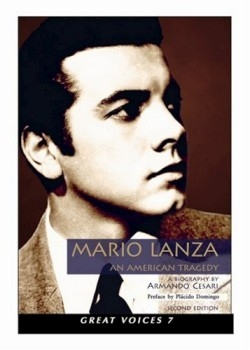
Mario Lanza
An American Tragedy
Although the title of this book may sound like a gossip-filled episode of True Hollywood Story, it’s actually a thoughtful look at the conflicted life of one of the world’s least respected, most talented tenors.
The author, a classically trained singer born in Venice, Italy, is a longtime fan who’s spent years studying Lanza’s life and is considered a leading authority on the singer. He has published articles and contributed to radio and television programs about Lanza. Here, he includes a CD that features rare recordings of the tenor in a practice session, as well as the famous Hollywood Bowl performance that ruined his opera career, but convinced Louis B. Mayer to sign him to MGM.
Conductor Peter Herman Adler says it best in the book: “Mario went to Hollywood and Hollywood became his Frankenstein.” Lanza, who at age twenty-two had shown such promise at the prestigious Tanglewood school of music, began to spend his time learning lines, making promotional appearances, and running around in rubber suits to lose weight. He was blinded by the fame and fortune of the movies, and knew he wouldn’t have found either if he’d stayed with opera. Lanza’s voice began to suffer from the crash dieting and lack of study, and he knew it—on top of everything else, he developed a serious case of operatic stage fright.
Despite all the references to Lanza’s bad career decisions, his love of money and food, and his deep-seated fear of success, in the end the book squarely blames everyone but Lanza for his failed opera career. According to Cesari, it’s the fault of untalented instructors, MGM’s poor choice of films (especially Because You’re Mine), the big paychecks that Lanza couldn’t live without, and bad press, including an August 6, 1951 Time magazine cover story that Cesari quickly dismisses—without explanation—as a “malicious piece of journalism.” In fact, Cesari is so quick to defend Lanza’s “amazing vocal range” that he glosses over most criticism. His constant praise of the tenor—Lanza’s voice “never failed to impress” and had an “impressively round velvety center,”—sometimes comes across like fawning.
Despite its awkwardness, Cesari’s appreciation of Lanza’s talent is ultimately endearing. The attached CD more than backs up his claims that Lanza’s rich, opera-worthy voice was unfairly dismissed as ordinary by the press. The glowing preface, written by Plácido Domingo, provides further weight to the argument and praises Lanza’s voice as “a force of nature to this day.”
On the strength of the included CD and its liner notes, the authoritative preface by Domingo, and Cesari’s unbreakable admiration for Lanza’s voice, the biography more than succeeds in polishing the tenor’s tarnished image.
Reviewed by
Christine Houde
Disclosure: This article is not an endorsement, but a review. The publisher of this book provided free copies of the book to have their book reviewed by a professional reviewer. No fee was paid by the publisher for this review. Foreword Reviews only recommends books that we love. Foreword Magazine, Inc. is disclosing this in accordance with the Federal Trade Commission’s 16 CFR, Part 255.
